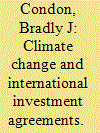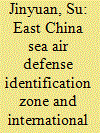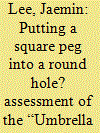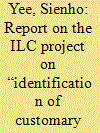| Srl | Item |
| 1 |
ID:
139153


|
|
|
|
|
| Summary/Abstract |
This article analyzes how International Investment Agreements (IIAs) might constrain the ability of governments to adopt climate change measures. This article will consider how climate change measures can either escape the application of IIA obligations or be justified under exceptions. First, this article considers the role of treaty structure in preserving regulatory autonomy. Then, it analyzes the role that general scope provisions can play in excluding environmental regulation from the scope of application of IIAs. Next, this article will consider how the limited incorporation of environmental exceptions into IIAs affects their interpretation and application in cases involving environmental regulation. The article then analyzes non-discrimination obligations, the minimum standard of treatment for foreign investors and obligations regarding compensation for expropriation. This analysis shows that tribunals can exclude environmental regulation from the scope of application of specific obligations as well.
|
|
|
|
|
|
|
|
|
|
|
|
|
|
|
|
| 2 |
ID:
139152


|
|
|
|
|
| Summary/Abstract |
Originating at the height of the Cold War, Air Defense Identification Zones (ADIZs), i.e. non-territorial airspace unilaterally designated by States for aircraft identification, had not encountered substantial protests until China's declaration of the East China Sea ADIZ in November 2013. Debates center not on the right to establish the ADIZ per se, but primarily on the purported application of identification rules to traversing aircraft, its overlap with pre-existing ADIZs claimed by other States, and the coverage of contested islands and rocks. This article argues that the identification of traversing civil aircraft does not jeopardize the paramount safety of international civil aviation, imposes only slight burden upon civil aircraft, and has garnered wide compliance. The identification of traversing military aircraft is a legitimate measure for coastal States to safeguard their security interest, and is constantly conducted by many States on a de facto basis. The overlap with ADIZs of other States and coverage of contested islands and rocks do not contradict international law and are legitimate measures for the maintenance of maritime and territorial interests. It is further suggested that all relevant States should negotiate mutually acceptable arrangements to avoid miscalculation and escalation, and to minimize confusions and inconveniences caused to third-party States.
|
|
|
|
|
|
|
|
|
|
|
|
|
|
|
|
| 3 |
ID:
139154


|
|
|
|
|
| Summary/Abstract |
An umbrella clause contained in a bilateral investment treaty should be examined from a larger, systemic perspective, instead of a microscopic analysis of whether it enhances the level of protection for foreign investors. In particular, an umbrella clause does not exactly dovetail with some of the basic principles and jurisprudence of public international law. The adoption of an umbrella clause also renders the administration of investment treaties and investment dispute settlement proceedings more complex and difficult to manage. As such, blind adoption and application of an umbrella clause would cause continuing tension and widening rifts in the long run. Viewed from this perspective, the wisdom of having an umbrella clause should be carefully scrutinized from the structural point of view. This realization necessitates the creation of important guidelines for states and investment tribunals concerning the formulation, interpretation and application of an umbrella clause.
|
|
|
|
|
|
|
|
|
|
|
|
|
|
|
|
| 4 |
ID:
139155


|
|
|
|
|
| Summary/Abstract |
This Report discusses the work of the ILC on identification of customary international law and proposes comments on that work, in the light of the AALCO members' concern with protecting their sovereignty, which manifests itself in three overarching considerations—the promotion of the quality in decision-making in the identification process, the reliance on only the quality exercise of State functions, and the representativeness of the State practice and opinio juris at issue.
|
|
|
|
|
|
|
|
|
|
|
|
|
|
|
|
| 5 |
ID:
139151


|
|
|
|
|
| Summary/Abstract |
The Ukrainian crisis poses a new challenge of an extraordinary dimension to traditional international law. Many well-established concepts of international law have been put to the test. For some, in the wake of the Kosovo advisory opinion a new international law is in the making and the Ukrainian crisis is only a further episode in a longer lasting process pointing in the same direction. For others, the Ukraine case is absolutely particular and in this context historical considerations should prevail over legal dogmatism. It is argued here that traditional international law is very well suited to deal with the Ukraine case. It is further submitted that international law as it stands is flexible enough to cater to the needs of all parties involved. While the concept of territorial sovereignty is not negotiable, there are plenty of instruments and procedures available that should not only guarantee full protection of the Russian speaking groups within the Ukrainian State but also the actual promotion of their rights.
|
|
|
|
|
|
|
|
|
|
|
|
|
|
|
|